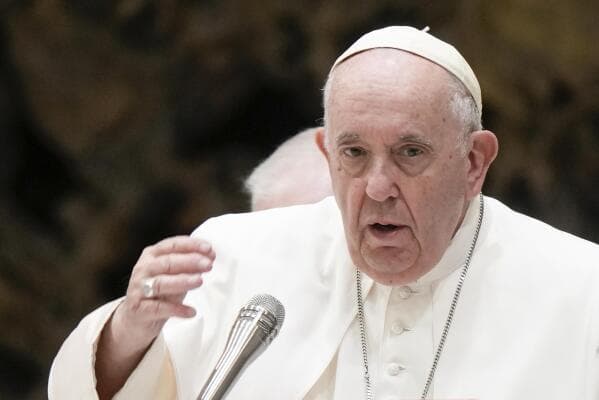ROME – We have, of course, seen this show before, but this time it’s with a fairly big plot twist.
It was six years ago when a small cluster of conservative cardinals issued a set of dubia, or theological doubts, to Pope Francis in the wake of his controversial 2016 document Amoris Laetitia, which opened a cautious door to the reception of communion by divorced and civilly remarried Catholics.
In that case the pope declined to ever respond, instead allowing various parties to speak in his name, though it was generally understood that Francis took a dim view of the initiative.
Given that precedent, it’s hardly surprising that another handful of conservative cardinals, including two of the authors of the original 2016 dubia, are at it again, this time submitting a new list of five doubts ahead of the Synod of Bishops on synodality that opens today.
In all honesty, such dubia are the ultimate in a rhetorical exercise. The cardinals aren’t actually asking questions, they’re making points – or, if you’re so inclined, grinding axes.
The surprise this time is not that dubia arose, but that Pope Francis actually chose to answer. In so doing, and depending on how you choose to look at it, the pontiff has either rendered the entire synodal exercise superfluous, or saved it from itself.
No matter what, we’re now living in a different political universe vis-à-vis the synod than we were just a scant 48 hours ago.
The five cardinals behind the new set of dubia, including American Cardinal Raymond Burke, published their queries on Monday, saying they’d submitted an initial set over the summer and got a reply from Francis, but because he didn’t answer in the traditional yes/no format, they revised the dubia and resubmitted them.
Just hours after they went public, Argentinian Cardinal Víctor Manuel Fernández, the pope’s new doctrine czar, published a Sept. 25 letter to the pope along with the pontiff’s original replies to the cardinals, thereby rendering those answers public domain.
On the hot-button issues of blessing same-sex unions and women clergy, the pope issued a cautious “yes” and a seemingly firm “no,” respectively, though his answers were qualified in both cases.
With regard to blessings, the pontiff said they’re possible on a case-by-case basis, as long as they don’t court confusion with the sacrament of marriage, and also said there shouldn’t be any generalized norms or policies on the question, either from the Vatican or bishops’ conferences, because it’s a matter of pastoral prudence.
On women priests, Francis reiterated Pope John Paul II’s “definitive” rejection and said that teaching must be adhered to by all, but allowed that the question could be studied, comparing it to the issue of the validity of Anglican ordinations.
Although the details of these replies will be subject to endless scrutiny, in some ways the most interesting point is that he commented at all.
Not only does it break with the 2016 precedent, but it also seems at odds with the spirit of consultation and listening at the heart of the synod. One might have expected the pontiff instead to say something like the following:
“Thanks for raising these questions, which provide great food for thought. However, since the whole point of the synod is to listen to what the People of God have to say before making decisions, I’m going to wait for the results of the discussions before providing my own answers. Let’s talk when it’s all over in 2024.”
Participants who have traveled to Rome expecting to be heard on these questions may be slightly put out that the pope has already taken positions before absorbing whatever it is they planned to say.
Indeed, for those who expected the synod’s flash points to pivot at least in part on the contested matters of women clergy and the blessing of same-sex unions, they might feel that Francis has made the entire exercise superfluous, raising the question of what the last two and half years of consultation, and the expense of bringing almost 400 people to Rome twice in the span of two years, is really for.
On the other hand.
On the other hand, synod organizers, papal acolytes, and the pope himself have been insisting since the beginning of this process that the point isn’t to address a narrow canon of contentious issues. Instead, it’s to imagine a new style of being Church, a new way of forging a future by journeying together in a spirit of dialogue and openness.
Doing so, they insist, has to involve a root-and-branch reexamination of ecclesiastical life on all levels, not simply rehashing fairly stale arguments on a few wearily familiar matters.
One could argue that by providing his answers on these matters now, Francis effectively has prevented synod discussions from being hijacked by controversy. Presumably, should someone now inside the synod want to begin banging the drum either for or against the blessing of same-sex unions, or the ordination of women, the almost reflexive response will be, “Come on, guys, the pope’s already spoken, so let’s move on.”
That prospect leaves us to ponder the potential irony that by short-circuiting his own listening exercise, the pope may have cleared a space to listen to other matters which are arguably more important for the long-term prospects of Catholicism.
However it plays out, one has to say this about any undertaking whatsoever in the Pope Francis era: It’s never, ever dull.
About that, at least, there’s no room for dubia at all.












